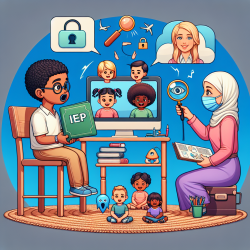Ensuring Safety in Online Speech Therapy: What Every Therapist Needs to Know
As a speech therapist providing online services, your priority is to deliver effective and engaging therapy sessions. However, an often overlooked aspect is the safety of these online interactions. While the convenience and accessibility of online speech therapy are undeniable, ensuring a secure virtual environment is equally crucial. This blog delves into data-driven strategies to enhance safety, ensuring that both therapists and students can focus on achieving great outcomes.
The Importance of Safety in Online Therapy
Online speech therapy has become an integral part of many schools' Individualized Education Programs (IEPs). However, the shift to digital platforms brings with it unique challenges. Data from a recent survey by the American Speech-Language-Hearing Association (ASHA) indicates that over 70% of therapists have encountered security concerns during online sessions. This highlights the need for robust safety protocols.
Key Safety Measures for Online Speech Therapy
To ensure the safety of your online sessions, consider implementing the following strategies:
- Use Secure Platforms: Choose platforms that offer end-to-end encryption and are compliant with regulations such as HIPAA and FERPA. This ensures that all communication is protected.
- Regular Software Updates: Keeping your software up-to-date is crucial in protecting against security vulnerabilities. Ensure that all devices used for therapy sessions have the latest security patches installed.
- Strong Password Policies: Implement strong, unique passwords for accessing therapy platforms. Encourage students and their families to do the same to prevent unauthorized access.
- Educate Students and Families: Conduct regular training sessions to inform students and their families about online safety practices. This includes recognizing phishing attempts and understanding the importance of privacy.
Monitoring and Feedback
Incorporating regular monitoring and feedback mechanisms can further enhance safety. Data-driven tools can help track session activities and identify any unusual patterns. Encourage open communication with students and their families to address any concerns promptly.
Conclusion
Safety in online speech therapy is not just about compliance; it's about creating a secure environment where students can thrive. By implementing these data-driven strategies, you can ensure that your sessions are not only effective but also safe. Remember, a secure virtual space is a foundation for successful therapy outcomes.
At TinyEYE, we are committed to supporting therapists in delivering safe and effective online speech therapy. For more resources and information, visit our website.










